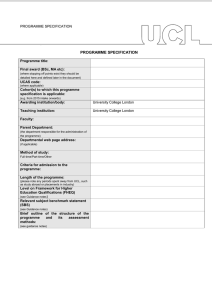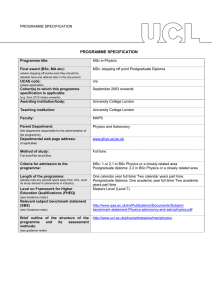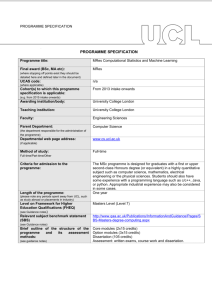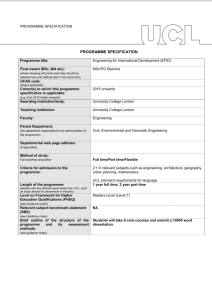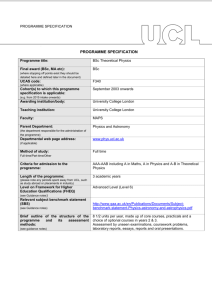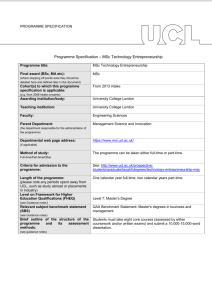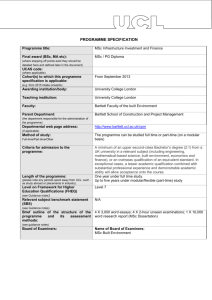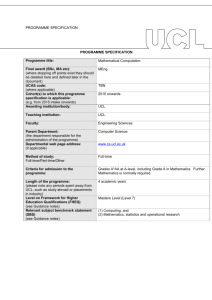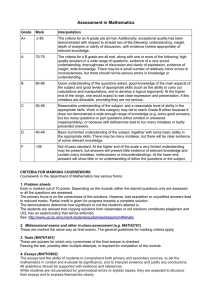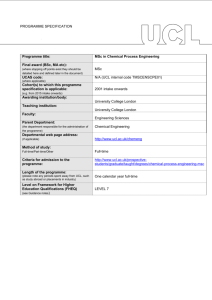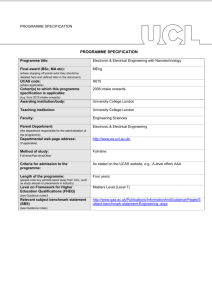MSc Financial Risk Management
advertisement
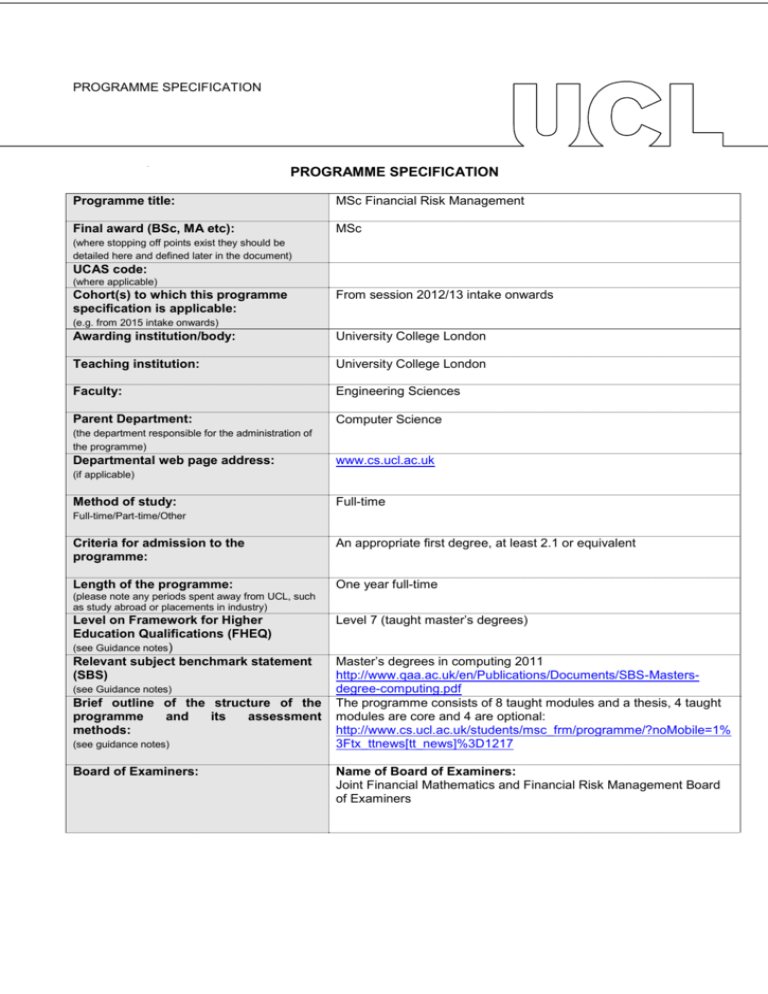
PROGRAMME SPECIFICATION PROGRAMME SPECIFICATION Programme title: MSc Financial Risk Management Final award (BSc, MA etc): MSc (where stopping off points exist they should be detailed here and defined later in the document) UCAS code: (where applicable) Cohort(s) to which this programme specification is applicable: From session 2012/13 intake onwards (e.g. from 2015 intake onwards) Awarding institution/body: University College London Teaching institution: University College London Faculty: Engineering Sciences Parent Department: Computer Science (the department responsible for the administration of the programme) Departmental web page address: www.cs.ucl.ac.uk (if applicable) Method of study: Full-time Full-time/Part-time/Other Criteria for admission to the programme: An appropriate first degree, at least 2.1 or equivalent Length of the programme: One year full-time (please note any periods spent away from UCL, such as study abroad or placements in industry) Level on Framework for Higher Education Qualifications (FHEQ) (see Guidance notes) Relevant subject benchmark statement (SBS) (see Guidance notes) Brief outline of the structure of the programme and its assessment methods: (see guidance notes) Board of Examiners: Level 7 (taught master’s degrees) Master’s degrees in computing 2011 http://www.qaa.ac.uk/en/Publications/Documents/SBS-Mastersdegree-computing.pdf The programme consists of 8 taught modules and a thesis, 4 taught modules are core and 4 are optional: http://www.cs.ucl.ac.uk/students/msc_frm/programme/?noMobile=1% 3Ftx_ttnews[tt_news]%3D1217 Name of Board of Examiners: Joint Financial Mathematics and Financial Risk Management Board of Examiners Professional body accreditation (if applicable): None (the programme will be put forward for BCS/ IET accreditation as appropriate, at the next opportunity) Date of next scheduled accreditation visit: 2014 academic session EDUCATIONAL AIMS OF THE PROGRAMME: The programme aims to create financial risk professionals who are trained simultaneously in mathematics, statistics and computation and draws on the combined resources of the UCL departments of Computer Science, Mathematics and Statistical Science. Risk professionals need: - Mathematical skills to analyse the modern financial models. Statistical skills to properly characterise real-world data. Computer science skills to run and analyse complex computer models. PROGRAMME OUTCOMES: The programme provides opportunities for students to develop and demonstrate knowledge and understanding, qualities, skills and other attributes in the following areas: A: Knowledge and understanding Knowledge and understanding of: Applications of mathematics, statistics and computation as applied to problems in finance. Teaching/learning methods and strategies: Provision of lectures, practical classes and problem solving exercises. Assessment: Written papers, coursework and oral examination. B: Skills and other attributes Intellectual (thinking) skills: Ability to solve numerical problems encountered when applying mathematics, statistics and computing to finance and financial risk. Teaching/learning methods and strategies: Throughout lectures numerical analysis is used. Typical problems encountered during professional practice are discussed. Problem sheets are provided and discussed. Assessment: Examination questions are usually a mixture of bookwork and unseen problem solving calculations. C: Skills and other attributes Practical skills (able to): Teaching/learning methods and strategies: To to program a computer to solve problems in financial modelling. Practical classes will be held to teach these experimental skills. These skills will be further refined during the research project. Assessment: The research project is assessed by a research report and, if needed, by oral examination. Module work will be assessed using a mixture of examination and take-home work. D: Skills and other attributes Transferable skills (able to): Teaching/learning methods and strategies: Able to use software packages to analyse and present results, to prepare a research presentation and to prepare a research Tutorial-type teaching is used on small group basis as needed. Practice sessions are given for presentation skills. report. Assessment: As part of the project assessment the students have a presentation to give and a research report to prepare. Both elements are assessed. The following reference points were used in designing the programme: the Framework for Higher Education Qualifications: (http://www.qaa.ac.uk/en/Publications/Documents/Framework-Higher-Education-Qualifications-08.pdf); the relevant Subject Benchmark Statements (http://www.qaa.ac.uk/en/Publications/Documents/SBS-Mastersdegree-computing.pdf ); the programme specifications for UCL degree programmes in relevant subjects (where applicable); UCL teaching and learning policies; staff research. Please note: This specification provides a concise summary of the main features of the programme and the learning outcomes that a typical student might reasonably be expected to achieve and demonstrate if he/she takes full advantage of the learning opportunities that are provided. More detailed information on the learning outcomes, content and teaching, learning and assessment methods of each course unit/module can be found in the departmental course handbook. The accuracy of the information contained in this document is reviewed annually by UCL and may be checked by the Quality Assurance Agency. Programme Organiser(s) Dr Tomaso Aste Name(s): Date of Production: 1 March 2011 Date of Review: January 2015 Date approved by Head of Department: January 2015 Date approved by Chair of Departmental Teaching Committee: Date approved by Faculty Teaching Committee January 2015 January 2015
